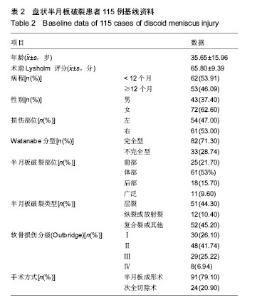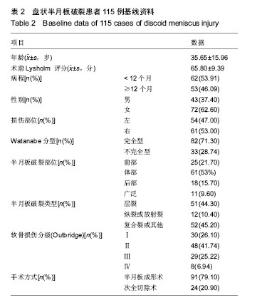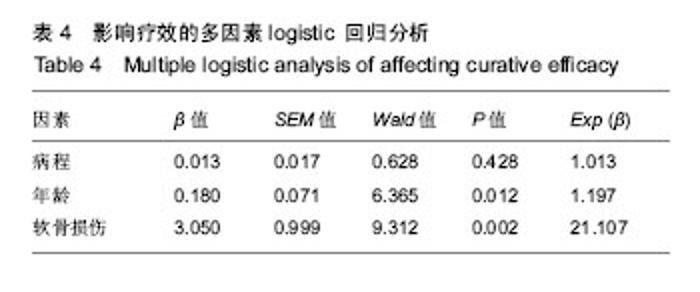| [1] Lin Z, Huang W, Ma L, et al. Kinematic features in patients with lateral discoid meniscus injury during walking. Sci Rep. 2018;8(1):5053. [2] Milewski MD, Krochak R, Duarte AJ, et al. Do Age and weightbearing radiographs affect lateral joint space and fibular height measurements in patients with discoid lateral meniscus? Orthop J Sports Med. 2018. doi: 10. 1177/2325967118760534. [3] Han SB, Babu CP, Choi JH, et al. Regeneration of lateral discoid meniscus after arthroscopic partial meniscectomy in an adult patient. Knee Surg Sports Traumatol Arthrosc. 2018; 26(8):2278-2281. [4] 郁贤舜,徐斌,徐洪港,等.微创关节镜下手术治疗盘状半月板破裂的疗效分析[J].安徽医药,2013,17(4):582-583.[5] Bae JH, Lim HC, Hwang DH, et al. Incidence of bilateral discoid lateral meniscus in an Asian population: an arthroscopic assessment of contralateral knees. Arthroscopy. 2012;28(7):936-941. [6] Patel NM, Cody SR, Ganley TJ. Symptomatic bilateral discoid menisci in children: a comparison with unilaterally symptomatic patients. J Pediatr Orthop. 2012;32(1):5-8. [7] Moon MS, Kwon KT, Park BK, et al. Long-term results of arthroscopic reshaping for symptomatic discoid lateral meniscus in children. Arthroscopy. 2015;31(5):867-873. [8] Papadopoulos A, Kirkos JM, Kapetanos GA. Histomorphologic study of discoid meniscus. Arthroscopy. 2009;25(3):262-268. [9] 孙书宏,张义庚.关节镜手术治疗盘状半月板损伤疗效及影响因素分析[J].华北理工大学学报(医学版),2017,19(5):379-384,390.[10] Xiang P, Fu Y, Xu SH. Diagnosis and treatment of 4 patients with knee discoid medial meniscus under arthroscopic. Zhongguo Gu Shang. 2017;30(6):566-569. [11] 王彬,程飚.盘状半月板的研究进展[J]. 中国临床医学, 2014, 21(2):234-236.[12] 张珂,徐斌,徐洪港,等.成人完全型与不完全型盘状半月板形态的MRI影像学分析[J].中国临床研究,2018,31(4):433-436.[13] Kalenderer O, Türken MA, Agus H. Surgical treatment of symptomatic discoid medial meniscus in childhood: a case report. J Pediatr Orthop B. 2012;21(4):359-360. [14] Kramer DE, Micheli LJ. Meniscal tears and discoid meniscus in children: diagnosis and treatment. J Am Acad Orthop Surg. 2009;17(11):698-707. [15] Sun Y, Jiang Q. Review of discoid meniscus. Orthop Surg. 2011;3(4):219-223. [16] Kocher MS, Klingele K, Rassman SO. Meniscal disorders: normal, discoid, and cysts. Orthop Clin North Am. 2003;34(3): 329-340. [17] Huang CZ, Fan WJ, Chen ZW, et al. Application of menisci reformation and repair in the treatment of the discoid meniscus injuries. Zhongguo Gu Shang. 2010;23(6):409-412. [18] 黄华扬,尹庆水,章莹,等.1310例侧膝关节半月板损伤关节镜下诊治效果分析[J]. 中华外科杂志,2004,42(12):730-732.[19] Carter CW, Hoellwarth J, Weiss JM. Clinical outcomes as a function of meniscal stability in the discoid meniscus: a preliminary report. J Pediatr Orthop. 2012;32(1):9-14. [20] Chedal-Bornu B, Morin V, Saragaglia D. Meniscoplasty for lateral discoid meniscus tears: Long-term results of 14 cases. Orthop Traumatol Surg Res. 2015;101(6):699-702. [21] Fu D, Guo L, Yang L, et al. Discoid lateral meniscus tears and concomitant articular cartilage lesions in the knee. Arthroscopy. 2014;30(3):311-318. [22] Choi SH, Shin KE, Chang MJ, et al. Diagnostic criterion to distinguish between incomplete and complete discoid lateral meniscus on MRI. J Magn Reson Imaging. 2013;38(2): 417-421. [23] 孙金鹏,雷光华.盘状半月板对软骨退变影响及不同术式软骨应力变化研究[D].长沙:中南大学,2013.[24] Kim JH, Bin SI, Lee BS, et al. Does discoid lateral meniscus have inborn peripheral rim instability? Comparison between intact discoid lateral meniscus and normal lateral meniscus. Arch Orthop Trauma Surg. 2018. doi:10.1007/ s00402-018-2987-9. [25] Koç A, Tokmak TT, Karab?y?k Ö, Türk G. Evaluation of anterior intermeniscal ligament in discoid lateral meniscus cases and presenting the accompanying meniscal pathologies with MRI. Acta Radiol. 2018. doi:10. 1177/0284185118776499. [26] Lau BC, Vashon T, Janghala A, Pandya NK. The sensitivity and specificity of preoperative history, physical examination, and magnetic resonance imaging to predict articular cartilage injuries in symptomatic discoid lateral meniscus. Pediatr Orthop. 2018;38(9):e501-e506. [27] 齐滋华,李传福,张晓明,等.膝关节半月板撕裂的MRI诊断[J].实用放射学杂志,2008,24(1):73-75.[28] 刘颖,杨少峰,陈丽霞.膝骨关节炎患者膝关节功能与生存质量的研究[J].中国康复医学杂志,2009,24(12):1092-1094.[29] 冯文哲,陆伟,许鉴,等.组织工程化软骨细胞移植修复膝关节大面积全层软骨缺损[J].中国组织工程研究, 2018,22(14): 2152-2156.[30] 谈绎文,郑昱新,顾新丰,王学宗.关节镜治疗成人外侧盘状半月板的短期疗效及软骨损伤对疗效的影响[J].中国骨与关节损伤杂志, 2017,32(10):1079-1081. |





